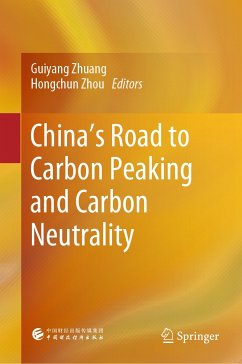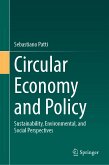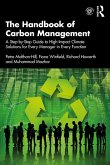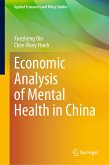China’s Road to Carbon Peaking and Carbon Neutrality (eBook, PDF)
Gebundener Preis 192,59 €**
181,89 €**
**Bis zum 31.03.2025 gebundener Aktionspreis des Verlages
inkl. MwSt. und vom Verlag festgesetzt.

0 °P sammeln
China’s Road to Carbon Peaking and Carbon Neutrality (eBook, PDF)
- Format: PDF
- Merkliste
- Auf die Merkliste
- Bewerten Bewerten
- Teilen
- Produkt teilen
- Produkterinnerung
- Produkterinnerung

Bitte loggen Sie sich zunächst in Ihr Kundenkonto ein oder registrieren Sie sich bei
bücher.de, um das eBook-Abo tolino select nutzen zu können.
Hier können Sie sich einloggen
Hier können Sie sich einloggen
Sie sind bereits eingeloggt. Klicken Sie auf 2. tolino select Abo, um fortzufahren.

Bitte loggen Sie sich zunächst in Ihr Kundenkonto ein oder registrieren Sie sich bei bücher.de, um das eBook-Abo tolino select nutzen zu können.
This book explains China's approach to carbon peaking and carbon neutrality. It provides knowledge related to emission peak and carbon neutrality in terms of the concept and connotations, practice path, energy basis, investment demand, technological innovation, consumption revolution, comprehensive response, carbon pricing mechanism, city leadership, goal synergy, role of carbon sinks, and global cooperation and gives answers to questions such as the profound significance of emission peak and carbon neutrality, China’s strategic considerations for setting the dual carbon goals, how should…mehr
- Geräte: PC
- ohne Kopierschutz
- eBook Hilfe
- Größe: 3.32MB
- Upload möglich
Andere Kunden interessierten sich auch für
![Circular Economy and Policy (eBook, PDF) Circular Economy and Policy (eBook, PDF)]() Sebastiano PattiCircular Economy and Policy (eBook, PDF)106,99 €
Sebastiano PattiCircular Economy and Policy (eBook, PDF)106,99 €![The Handbook of Carbon Management (eBook, PDF) The Handbook of Carbon Management (eBook, PDF)]() Petra Molthan-HillThe Handbook of Carbon Management (eBook, PDF)31,95 €
Petra Molthan-HillThe Handbook of Carbon Management (eBook, PDF)31,95 €![Absolute Essentials of Green Business (eBook, PDF) Absolute Essentials of Green Business (eBook, PDF)]() Alan SitkinAbsolute Essentials of Green Business (eBook, PDF)22,95 €
Alan SitkinAbsolute Essentials of Green Business (eBook, PDF)22,95 €![Ecommerce Reimagined (eBook, PDF) Ecommerce Reimagined (eBook, PDF)]() Sharon GaiEcommerce Reimagined (eBook, PDF)32,95 €
Sharon GaiEcommerce Reimagined (eBook, PDF)32,95 €![Economic Analysis of Mental Health in China (eBook, PDF) Economic Analysis of Mental Health in China (eBook, PDF)]() Xuezheng QinEconomic Analysis of Mental Health in China (eBook, PDF)128,39 €
Xuezheng QinEconomic Analysis of Mental Health in China (eBook, PDF)128,39 €![Corporate Strategy and Sustainability (eBook, PDF) Corporate Strategy and Sustainability (eBook, PDF)]() Peter N. NemetzCorporate Strategy and Sustainability (eBook, PDF)37,95 €
Peter N. NemetzCorporate Strategy and Sustainability (eBook, PDF)37,95 €![Asian Brand Strategy (eBook, PDF) Asian Brand Strategy (eBook, PDF)]() M. RollAsian Brand Strategy (eBook, PDF)40,95 €
M. RollAsian Brand Strategy (eBook, PDF)40,95 €-
-
-
This book explains China's approach to carbon peaking and carbon neutrality. It provides knowledge related to emission peak and carbon neutrality in terms of the concept and connotations, practice path, energy basis, investment demand, technological innovation, consumption revolution, comprehensive response, carbon pricing mechanism, city leadership, goal synergy, role of carbon sinks, and global cooperation and gives answers to questions such as the profound significance of emission peak and carbon neutrality, China’s strategic considerations for setting the dual carbon goals, how should China achieve the dual carbon goals, and what far-reaching impact will the dual carbon campaign have on China and the world. It discusses the wide-ranging content in an easy-to-understand way. This book is a reference for global readers to learn about green and low-carbon development in China.
Produktdetails
- Produktdetails
- Verlag: China Financial & Economic Publishing House / Springer Nature Singapore
- Erscheinungstermin: 13. Oktober 2023
- Englisch
- ISBN-13: 9789819931224
- Artikelnr.: 69154758
- Verlag: China Financial & Economic Publishing House / Springer Nature Singapore
- Erscheinungstermin: 13. Oktober 2023
- Englisch
- ISBN-13: 9789819931224
- Artikelnr.: 69154758
- Herstellerkennzeichnung Die Herstellerinformationen sind derzeit nicht verfügbar.
Guiyang Zhuang (Ph.D. in Economics) is the deputy director of the CASS Research Institute for Eco-civilization, a second-level researcher, a doctoral tutor at the University of Chinese Academy of Social Sciences, and a recipient of the State Council’s special government allowance. He is a chief expert under major programs of the National Social Science Fund of China, having presided over many national-level and CASS’ major scientific research programs. Having long researched The Economics of Climate Change, he is a scholar in China’s social science circles who studied low-carbon economy and policy on climate change early and obtained outstanding achievements. He is one of the academic leaders for the dominant discipline construction project of The Economics of Climate Change in CASS’ “Dengfeng plan”. His research achievements won the CASS Award for excellent scientific research achievement and excellent countermeasure information. He won the title of the Second China Eco-Civilization Award for Advanced Individual in 2019.
Hongchun Zhou is a researcher at the Development Research Center of the State Council and a recipient of the State Council’s special government allowance. He has studied the industries and policies relating to resources, the environment, sustainable development, etc. He graduated from Nanjing University in 1982 and obtained the doctorate in 1992. He is a visiting professor at eight universities including Nanjing University, Nankai University, and University of Science and Technology of China; an expert in circular economy at China Research Institute for Social Sciences; a visiting researcher of Research Center for Eco-environmental Sciences of the Chinese Academy of Sciences; an expert of the Circular Economy Committee of Tsinghua University, etc. His publications include Circular Economy Science and Low-carbon Economy Science. He won the special prize, first prize, and second prize of China Development Award, the second prize of Beijing People’s Government Award for Science and Technology Progress, etc.
Hongchun Zhou is a researcher at the Development Research Center of the State Council and a recipient of the State Council’s special government allowance. He has studied the industries and policies relating to resources, the environment, sustainable development, etc. He graduated from Nanjing University in 1982 and obtained the doctorate in 1992. He is a visiting professor at eight universities including Nanjing University, Nankai University, and University of Science and Technology of China; an expert in circular economy at China Research Institute for Social Sciences; a visiting researcher of Research Center for Eco-environmental Sciences of the Chinese Academy of Sciences; an expert of the Circular Economy Committee of Tsinghua University, etc. His publications include Circular Economy Science and Low-carbon Economy Science. He won the special prize, first prize, and second prize of China Development Award, the second prize of Beijing People’s Government Award for Science and Technology Progress, etc.
Chapter 1. The Proposal and Conceptual Connotations of Emission Peak and Carbon Neutrality Goals.- Chapter 2. The Practice Roadmap to Emission Peak and Carbon Neutrality.- Chapter 3. Energy Base for Emission Peak and Carbon Neutrality.- Chapter 4. Investment Demand for Emission Peak and Carbon Neutrality.- Chapter 5. Technological Innovations for Emission Peak and Carbon Neutrality.- Chapter 6. Change of Consumption in the Context of Emission Peak and Carbon Neutrality.- Chapter 7. Comprehensive Economic and Social Response in the Context of Emission Peak and Carbon Neutrality.- Chapter 8. Carbon Pricing Mechanism for Emission Peak and Carbon Neutrality.- Chapter 9. Urban Leadership in Emission Peak and Carbon Neutrality.- Chapter 10. Synergy for Emission Peak and Carbon Neutrality Goals.- Chapter 11. The Role of Carbon Sinks in Emission Peak and Carbon Neutrality.- Chapter 12. Global Collaboration for Emission Peak and Carbon Neutrality Postcript.
Chapter 1. The Proposal and Conceptual Connotations of Emission Peak and Carbon Neutrality Goals.- Chapter 2. The Practice Roadmap to Emission Peak and Carbon Neutrality.- Chapter 3. Energy Base for Emission Peak and Carbon Neutrality.- Chapter 4. Investment Demand for Emission Peak and Carbon Neutrality.- Chapter 5. Technological Innovations for Emission Peak and Carbon Neutrality.- Chapter 6. Change of Consumption in the Context of Emission Peak and Carbon Neutrality.- Chapter 7. Comprehensive Economic and Social Response in the Context of Emission Peak and Carbon Neutrality.- Chapter 8. Carbon Pricing Mechanism for Emission Peak and Carbon Neutrality.- Chapter 9. Urban Leadership in Emission Peak and Carbon Neutrality.- Chapter 10. Synergy for Emission Peak and Carbon Neutrality Goals.- Chapter 11. The Role of Carbon Sinks in Emission Peak and Carbon Neutrality.- Chapter 12. Global Collaboration for Emission Peak and Carbon Neutrality Postcript.
Chapter 1. The Proposal and Conceptual Connotations of Emission Peak and Carbon Neutrality Goals.- Chapter 2. The Practice Roadmap to Emission Peak and Carbon Neutrality.- Chapter 3. Energy Base for Emission Peak and Carbon Neutrality.- Chapter 4. Investment Demand for Emission Peak and Carbon Neutrality.- Chapter 5. Technological Innovations for Emission Peak and Carbon Neutrality.- Chapter 6. Change of Consumption in the Context of Emission Peak and Carbon Neutrality.- Chapter 7. Comprehensive Economic and Social Response in the Context of Emission Peak and Carbon Neutrality.- Chapter 8. Carbon Pricing Mechanism for Emission Peak and Carbon Neutrality.- Chapter 9. Urban Leadership in Emission Peak and Carbon Neutrality.- Chapter 10. Synergy for Emission Peak and Carbon Neutrality Goals.- Chapter 11. The Role of Carbon Sinks in Emission Peak and Carbon Neutrality.- Chapter 12. Global Collaboration for Emission Peak and Carbon Neutrality Postcript.
Chapter 1. The Proposal and Conceptual Connotations of Emission Peak and Carbon Neutrality Goals.- Chapter 2. The Practice Roadmap to Emission Peak and Carbon Neutrality.- Chapter 3. Energy Base for Emission Peak and Carbon Neutrality.- Chapter 4. Investment Demand for Emission Peak and Carbon Neutrality.- Chapter 5. Technological Innovations for Emission Peak and Carbon Neutrality.- Chapter 6. Change of Consumption in the Context of Emission Peak and Carbon Neutrality.- Chapter 7. Comprehensive Economic and Social Response in the Context of Emission Peak and Carbon Neutrality.- Chapter 8. Carbon Pricing Mechanism for Emission Peak and Carbon Neutrality.- Chapter 9. Urban Leadership in Emission Peak and Carbon Neutrality.- Chapter 10. Synergy for Emission Peak and Carbon Neutrality Goals.- Chapter 11. The Role of Carbon Sinks in Emission Peak and Carbon Neutrality.- Chapter 12. Global Collaboration for Emission Peak and Carbon Neutrality Postcript.







